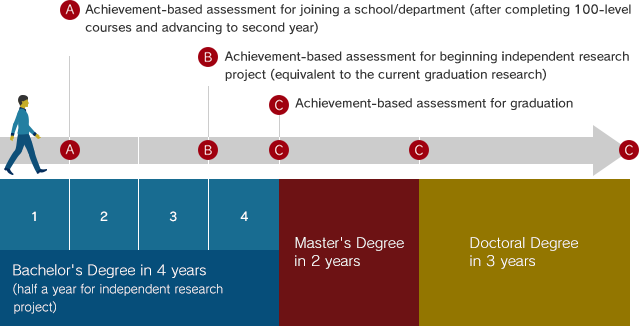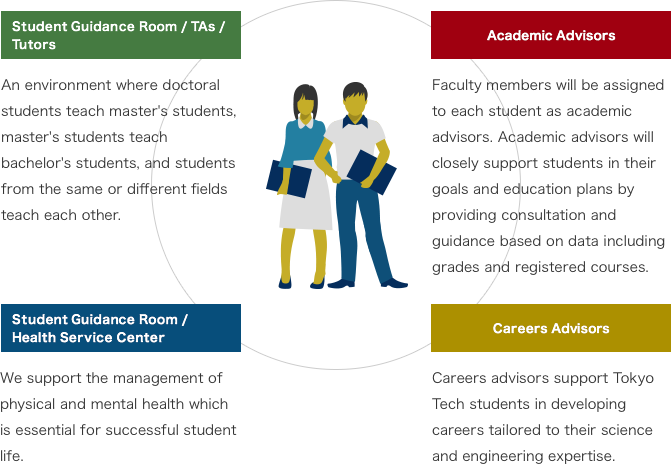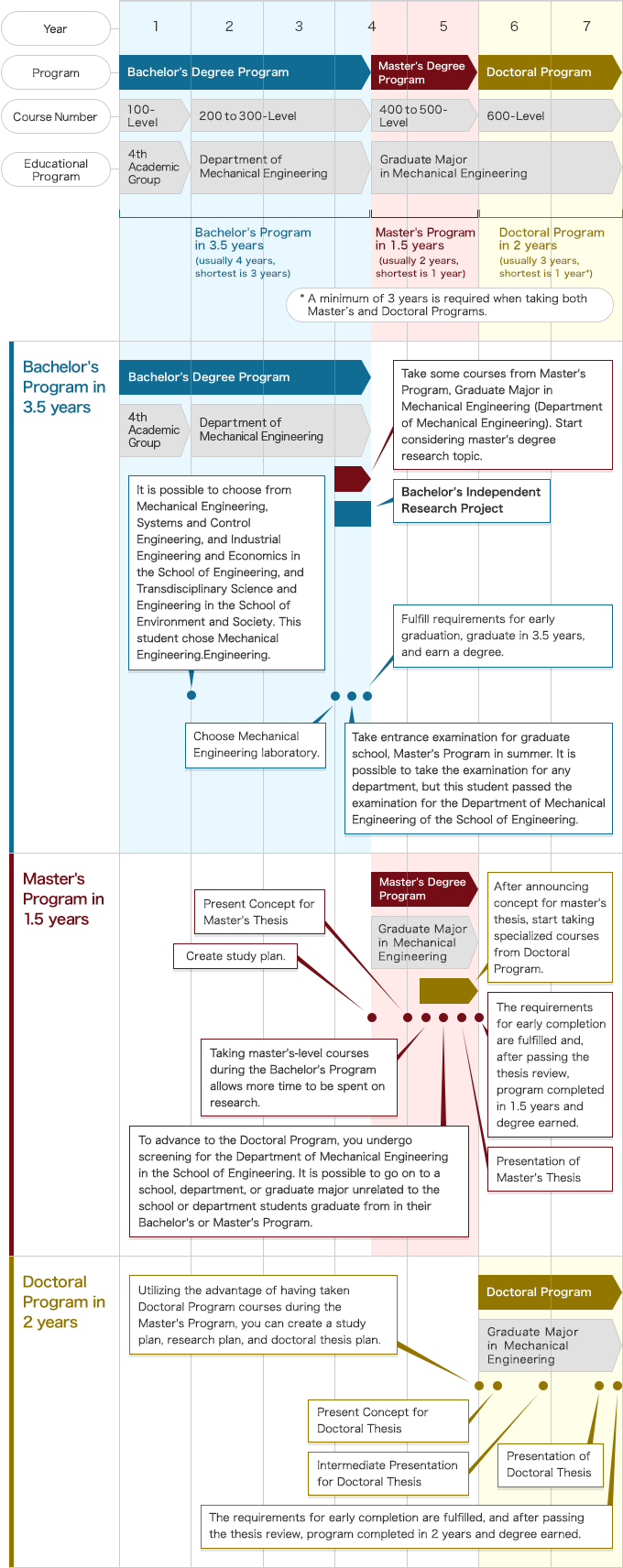Features of Science Tokyo education
Science Tokyo invites students into world-class research, promoting an education where they learn and think for themselves. In addition to specialized education, it fosters the development of liberal arts and versatile skills, nurturing the ability to create new values in society.
Science and Engineering × Medical and Dental Sciences: Integrated learning
At Science Tokyo, students not only deepen their expertise in either science and engineering or medical and dental sciences, but they also gain the ability to create new values through activities that cross both fields. This enables them to pioneer new careers like never before.
Learning through specialized subjects: "Integrated Medical, Dental, and Science and Engineering Education"
Science and engineering students have been systematically studied subjects in medical and dental sciences, and vice versa, starting since April 2025 in both undergraduate and graduate programs. This new generation of learning aims to combat difficult diseases and pandemics, promote innovation globally, and forge a better future society through science.
Undergraduate program: "Integrated Medical, Dental, and Science and Engineering Program"
From April 2025, an undergraduate program titled "Integrated Medical, Dental, and Science and Engineering Program" is being established. This program will enable students to learn the basic knowledge and research skills of fields different from their own expertise, laying the foundation for researchers, engineers, and medical professionals capable of conducting advanced research and development that integrates multiple specializations.
Graduate program: "Science and Technology for Health Care and Medicine"
The "Science and Technology for Health Care and Medicine" was launched in April 2025 as a graduate education course integrating medical and dental sciences with science and engineering. It aims to cultivate global professionals who deeply understand humanity and strive to achieve a sustainable, safe, and secure society. The science and engineering component will be established as a degree program, while the medical and dental component will be set up as a special professional study program.
Cross-disciplinary course enrollment between science and engineering and medical and dental sciences
Students from science and engineering and medical and dental sciences are able to enroll in each other's courses based on their interests and schedules.
Liberal arts education: "Ookayama day"
Starting in April 2025, all new undergraduate students from science and engineering and medical and dental sciences gather once a week for the first two months after enrollment for "Ookayama day" at the Ookayama campus. There, they engage in unique classes such as the "Risshi Project," where they exchange ideas in small groups across different fields, fostering interdisciplinary interactions. "Ookayama day" supports the formation of lifelong friendships.
Extracurricular activities: "club activities"
Sports, cultural, technical, and medical clubs. Students can participate in over 120 unique and diverse clubs and societies across campuses. There are activities that involve setting high team goals, as well as those that allow students to pursue their individual interests to the fullest. The university supports extracurricular activities that enrich student life.
Features of Science and Engineering
Science Tokyo provides a curriculum that allows students to realize the depth of science and technology and its power to change society, while cultivating the skills to achieve their goals -- the skills to learn independently, creativity, and expressiveness.
In addition to mastering their specialized field, students learn related fields and their social background and relevance. While cooperating and working hard with others, students mature into adults with leadership ability, and the confidence to succeed in society and the world.
Integrated Program and Wedge-Shaped Style Education

Seamless Degree Program
Science Tokyo provides a unique curriculum to cultivate students with the drive to excel and the vision to contribute to society through science and technology.
Features
The system allows for a smoother transition from the Bachelor's to Master's Program as well as from the Master's to Doctoral Program. (*)
- We provide a seamless education in specialized fields from the Bachelor's Program to graduate schools. With many students choosing to continue on to graduate school, the links with higher-level programs and their content are clearly shown.
- Aspiring and capable students can progress more quickly. Undergraduates may take master's-level courses and master's students may take doctoral-level courses.
This education system enables students to better plan their path from entrance to graduation, allowing them to choose from various options and challenges based on their interests.
Wedge-Shaped Style Education
What is Wedge-shaped Style Education?
Wedge-shaped style education is designed to generate an upward spiral of knowledge and ability by providing liberal arts education and specialized education in an organically interrelated manner from Bachelor's Program to Doctoral Program. Students enroll in specialized courses and liberal arts courses immediately after enrollment. The number of specialized courses increases in subsequent years, but students continue taking Liberal Arts and Basic Science Courses (including Entrepreneur Courses) until graduation or completion of program.
Why Wedge-Shaped Style Education?
It enables students to cultivate deep insight, a sense of ethics, solid specialized academic ability, unfettered inventiveness, creativity, and the practical ability to integrate these qualities. Students acquire cutting-edge science and engineering expertise, deepen their understanding of the social significance of their studies, and cultivate character building and inclusive values.
- Students from other universities may also enroll in the Master's Program and Doctoral Program. Undergraduate students must pass an entrance examination to enroll in the Master's Program, and master's students must undergo screening to enter the Doctoral Program. Students can advance to a field other than that which they graduated from or completed.
Standard Timeline for Students and 11 features
Feature1 First-Year Undergraduate Education
Feature2 Liberal Arts Education
Feature3 Entrepreneurship Education
Feature4 Flexible Study -- Majors, Minors, and Other Education Programs
Feature5 Academic Quarter System
Under the quarter system, one academic year will be divided into four quarters.

There are no required courses in 2Q of the third year of the Bachelor's Program, so students can easily study abroad using 2Q and the summer vacation.
- Intensive learning in shorter periods will enhance learning effectiveness.
- Flexible academic plans will make it easier to study abroad or do internships.
- Offering the same courses in multiple quarters will better accommodate students in terms of learning speed.
- With the quarter system, Science Tokyo's academic calendar will align with more overseas universities. Enrollment in Science Tokyo will be more accessible for international students, and Science Tokyo students will be better able to participate in internships and study abroad.
Feature6 Achievement-Based Assessment
Academic progress will be measured using achievement-based assessment emphasizing the content and extent of knowledge acquired, enabling students to proceed to the next level according to their attainment, which is determined by achievement-based assessment of each course, overall academic progress, and other factors.
Also, based on Science Tokyo's education policy (professional skill set, practical skill set, etc.), five abilities expected of our graduates and those who complete programs at Science Tokyo are specified. The curriculum is designed to enable each student to acquire these abilities through systematic learning in Core Courses and Liberal Arts and Basic Science Courses, and Research Seminars/research thesis (graduate students only) by graduation or completion of program.

- Students can better grasp their strengths and weaknesses and take charge of their own education paths according to their achievement level. Academic advisors will provide guidance based on students' learning portfolios.
- Students can monitor their progress which makes it easier to set future goals and acquire the required knowledge.
- Aspiring and capable students are able to progress more quickly if they pass an achievement-based assessment.
Feature7 Cultivate Globally Valued Cultural Skills
Science Tokyo aims to cultivate individuals who contribute to the world through science and technology. International experience is indispensable to those individuals, so Science Tokyo emphasizes study abroad and/or international experience and education in English.
Studying Abroad / International Experience
We strongly recommend students to study abroad or gain international experience by the time they complete their Master's Program.
Tokyo Tech is reinforcing its student support system by forming more academic partnerships promoting study abroad programs, and by increasing programs and language lectures, and opportunities to learn with international students.
Courses Taught in English
We are working to increase our offering of courses taught in English. Over 90% of classes in the Graduate Program are offered in English.
Feature8 Student Support System
Faculty members will be assigned to each student as academic advisors from the Bachelor's Program to graduation/completion. They provide guidance based on data including grades and registered courses, refer to the Science Tokyo learning portfolio that students create, and support students in their goals and study plans. Especially in the year of the Bachelor's Program, when students are not used to life on campus, advisors support students regarding learning methods and academic life through seminars and consultations, and help them understand differences between high school and university.

Feature9 Education Derived from Research
Students can learn directly from researchers conducting internationally valued research. The level of education provided in daily classes and laboratories is extremely high.
The following courses are provided in laboratories.
(*indicates the year students take that course according to the standard timeline.)
Research Opportunity Courses (*third year of Bachelor's Program)
In this required course students gain research experience in multiple laboratories. Students can choose research laboratories from different campuses or fields. Students learn the content and atmosphere of each research laboratory, are taught by faculty members and graduate students of that laboratory, and gain research experience. Students can find out what research topic they wish to work on.
Bachelor's Independent Research Project (*first half of fourth year in Bachelor's Program)
In this required course (for 2 quarters) students join a laboratory, conduct research on a specific subject, and write a graduation thesis. Experiencing research at a university is the essence of this course. In laboratories there are not only faculty members, but also young graduate students in the Master's and Doctoral Programs, exchange students, postdoctoral researchers, etc., comprising diverse talent who excel at research. Experience the joy of learning while working with fellow students and exploring a research subject in a top-level environment.
Bachelor's Advanced Independent Research Project (*second half of fourth year in Bachelor's Program)
This course is taken after completing the Bachelor's Independent Research Project. Basically, students study the topic of their Bachelor's Independent Research Project in more depth, or tackle another subject in the laboratory where they conducted their Bachelor's Independent Research Project. In cases where the student has been accepted into the Master's Program, they may prepare a research subject for their Master's, advancing and expanding their research.
Research Seminars (Graduate Program)
Students take Research Seminars in the Graduate Program. Research involves deeply investigating a subject and figuring out its meaning and essence. Therefore, the Research Seminar uses different approaches depending on the field or research laboratory. Under the guidance of academic supervisors, students generally read papers and participate in discussions to cultivate their knowledge relating to their own research. Students receive suggestions on their research from faculty members and acquire new perspectives through discussion with fellow students with different research topics, which enables them to pursue their research in more depth.
Feature10 University-wide Education Program in Data Science and Artificial Intelligence
Feature11 An excellent academic environment
Early Graduation/Completion Timeline
The curriculum allows aspiring, capable, and excellent students to progress more quickly.
Students can complete the Bachelor's, Master's, and Doctoral Programs within 6 years (following the standard timeline, it takes 9 years.)
Example: Completing Bachelor's, Master's, and Doctoral Programs in 7 Years

Diverse Possibilities for the Future
Features of Medical and Dental Sciences
As medical technology evolves rapidly, our university, with the oldest dental faculty among national universities and the first health and hygiene department at a national university, has always been a pioneer in medical and dental education and research. Based on this experience, we have built an excellent curriculum at a global standard, superior faculty, and top-notch facilities to foster professionals who can excel on the world stage in medicine and dentistry. We aim to nurture individuals with broad education, rich humanity, high ethics, creativity and pioneering spirit, international perspective, and leadership.
Interprofessional education
Even in future medicine where AI plays a significant role, it is believed that interprofessional collaboration, which integrates communication, knowledge, experiences, and values, can only be achieved by humans. Our university has been providing opportunities to experience interprofessional collaboration since 2012 with the "Introduction to Team Medicine" and since 2020 with the "Introduction to Team Medicine Implementation," conducting interactive classes focused on patient-centered care. Currently, the direction is indicated to make the interprofessional education, which the entire university has been addressing, a common initiative within the subjects of each department (Interprofessional Collaboration I, II, III).
Global education
To cultivate individuals who will tackle complex global health issues and contribute to improving the level of health worldwide, Science Tokyo offers a global leadership program (HSLP), preparatory courses for study abroad, and a variety of exchange programs.
Liberal arts education
We aim to develop individuals with a broad education that enables them to understand diverse cultures and the world and who possess rich humanity and ethics to understand others, along with the creativity to propose and solve problems, serving as the foundation for internationally competent medical professionals.
Medical data science and AI education
We aim to develop model curricula and teaching materials for mathematics, data science (DS), and AI education in the fields of medicine and dentistry, incorporate them into our curriculum, and disseminate and expand them to medical and dental schools nationwide.
Specialized education
The Medical and Dental Sciences faculties consist of the Faculty of Medicine, Department of Medicine; the Faculty of Medicine, Department of Health and Hygiene; the Faculty of Dentistry, Department of Dentistry; the Faculty of Dentistry, Department of Oral Health; the Graduate School of Medical and Dental Sciences; the Graduate School of Health and Hygiene; the Institute of Biomaterials and Bioengineering; and the Institute of Advanced Biomedical Engineering and Science. We aim not only to train doctors, dentists, nurses, clinical laboratory technicians, dental hygienists, and dental technicians with a healing heart and scientific perspective, but also to build research and academic systems in the medical and life sciences fields. Our goal is to nurture outstanding medical professionals and researchers, contributing broadly to people and society.
School of Medicine
School of Health Care Sciences Nursing Sciences
School of Health Care Sciences Medical Technology
School of Dentistry
Course for Oral Health Care Sciences
Course for Oral Health Engineering
Graduate education
Integrated preventive medical and dental health sciences
Integrated preventive medical and dental health sciences refer to an academic system that collects and manages an integrated database of individual genome and epigenome information, real-time medical records, lifestyle, and environmental factor information, analyzes it through data mining, and provides preventive medicine. To promote this field, we have established the Preventive Medical and Dental Engineering Course (Bioinformatics Program) in the Department of Medical and Dental Sciences (Doctoral Program); the Preventive Medical and Dental Engineering Course (Advanced Medical Devices IoT Program / Disease Life Drug Science Program) in the Department of Life Science and Medical Sciences (Doctoral Program); and the Preventive Medicine Course in the Department of Medical, Dental, and Health Sciences.
1. Preventive Medical and Dental Engineering Course
To promote the integrated preventive medical and dental health sciences, which aims at comprehensive understanding of disease mechanisms through the integrated analysis of various omics data related to diseases and the development of health management algorithms based on it, we have established the Preventive Medical and Dental Engineering Course, spanning the Department of Medical and Dental Sciences and the Department of Life Science and Medical Sciences. This course aims to foster human resources who can contribute to the social implementation of these advancements.
2. Preventive Medicine Course
In our super-aging society, reducing the national burden caused by soaring medical costs is a social demand, and preventive medicine plays a significant role as a gatekeeper preventing entry of diseases. In the near future, by integrating real-time electronic medical information, individual genome, and epigenome information with real-time data on lifestyle and environmental factors through advancements in sensing technology, we can build "medical big data." Developing and analyzing various data mining technologies based on this analysis will enable personalized preventive medicine. The Preventive Medicine Course is established to foster the human resources needed to respond to these significant social environmental changes.
Master of Public Health in Global Health (MPH) course
To solve global health issues, we focus on disease prevention, identify and address social factors surrounding diseases, health care systems, universal health coverage, and cross-border factors such as climate change and air pollution. We aim to develop: 1. individuals who can devise effective and efficient prevention strategies from a global perspective for common human health challenges, and 2. individuals who can collaborate with various specialists towards the same goal and implement solutions in society with community understanding.